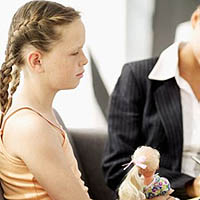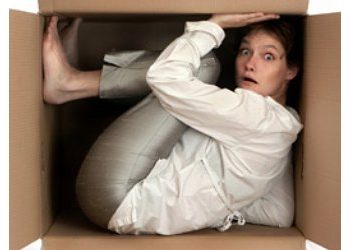How to recognize children's psychosis? How to help a sick child? Answers to these questions you will find in this article.
Content
Psychosis is a severe mental illness characterized by violation of the ability to distinguish fantasies and reality and adequately evaluating what is happening. Moreover, psychosis is a common term used to describe certain types of severe mental health disorders.
Any type of psychosis significantly harms the life of a sick child. Psychosis, as a rule, creates problems with the organization of thinking, the right use of the language, with the control of motivation - behavior in accordance with the publications, manifestations of emotions and relations with other people.
«Typical» psychotic behavior is difficult to describe, because it can take very different forms. One of the most obvious signs of psychotic behavior is hallucination, in which he sees a sick child, hears, tangles, feels taste and smells something that does not exist. Another obvious feature is nonsense - improper interpretation of intentions or the meaning of what actually exists. Similar (although less indicative) types of behavior include inventing words, laughter over things that are not at all funny or even unpleasant, strong irritation for any occasion or completely no reason.
Hallucinations, nonsense and similar types of behavior allow you to clearly distinguish children with psychosis. For example, having heard a tale about Cinderella, a child who does not suffer from psychosis can dream of becoming heroine and feels disgust when thinking about an angry stepmach. A child with psychosis can believe that he or she is Cinderella and that evil stepmother is really in this very room.
For many years, medical experts are discussed, affecting or no psychosis of children in pre-conscription age, and if so, how to distinguish them from adult psychoses and from other children's violations. Although these controversial issues are still subject to discussion, most medical experts now agree that children in predominant age may suffer from psychosis, which, as once thought, was found only in adolescents and adults. Most experts also agree that accurate proof of psychosis, namely, the ability to express the words roughly distorted perception of reality must exist before the diagnosis can be raised. Thus, it is impossible to diagnose specific psychosis, while the child can not speak, although it is possible to suspect psychosis due to a gross violation of behavior.
Children's psychoses may arise due to a number of short-term or long-term physical states, including the use of drugs (for example, at the beginning or period of cessation of steroids), high temperature, meningitis and impaired hormonal equilibrium (for example, increased or reduced thyroid function). In most cases, psychosis caused by temporary physical problems, the attack ends when problems are allowed or dull. Sometimes, however, complete recovery is impossible, until several weeks after the underlying disease is cured, since the patient needs time to recover and adapt to reality.
Although many types of physical diseases can lead to psychotic episodes, psychosis sometimes develop without such diseases and proceed quickly or continue for a long time, or episodically for months or even years. Experts suggest that such psychosis are caused by biochemical deviations that may be present at birth or are purchased with such states as abuse of drugs or alcohol.
It turns out that biochemical deviations in some people lead only to temporary attacks of psychosis and only in the period of certain types of external influences, such as a stress situation. In rare cases, for example, the older children arise psychotic symptoms, such as hallucinations, in response to a stressful situation, such as departure from the house upon admission to college. Such «Psychotic breakdowns» have a tendency to be briefs lasting only a few days or weeks.
Other people seem to be born with such severe constitutional abnormalities that psychosis appear spontaneously at an early age and disability remains throughout life. The reason for this phenomenon is not clear. Experts are confident that external stresses are never the only factor, and there are no convincing evidence that they play at all some role when symptoms appear in early childhood. Medicine researchers continue to check the theory that genetic factors play a role in the emergence of sustainable psychosis.
 The child may need a repeated examination for weeks or even months of various professionals, such as a doctor who specializes in development diseases, a children's psychiatrist, as well as a neurologist (nervous system specialist), a otolaryngologist (Specialist in ear disease, throat and nose ) as well as speech and language expert (speech therapist).
The child may need a repeated examination for weeks or even months of various professionals, such as a doctor who specializes in development diseases, a children's psychiatrist, as well as a neurologist (nervous system specialist), a otolaryngologist (Specialist in ear disease, throat and nose ) as well as speech and language expert (speech therapist).
Diagnostic procedures include a thorough physical and psychological examination, long-term observation of the behavior of a child, testing mental abilities, hearing checking and speech.
A child can be hospitalized for various studies of the central nervous system. If it turns out that a child with psychosis has a health problem underlying, diagnostic procedures can be focused on determining the main cause of the disease.
If parents have any doubts about the diagnosis, for example, whether it is accurate enough, they must hear the opinion of other doctors.
Short-term episodes of psychosis caused by problems with physical health pass when the main disease disappears. However, seriously affected children should be consulted by psychic health professionals - a psychiatrist, a psychologist or social worker to deal with psychotic episodes. Usually you need only a few discussions, although some children may need long therapy.
Also a child who is experiencing a psychotic breakdown due to a stressful situation often needs short-term or long psychotherapy. In some cases, such children can help the short-term or long-term use of drug treatment, which compensates for the estimated biochemical disorders.
Short-term psychotic episodes associated with underlying physical health violations can be warned only when curing or preventing the main reasons.









